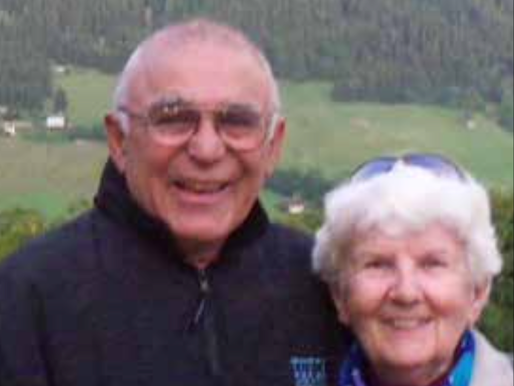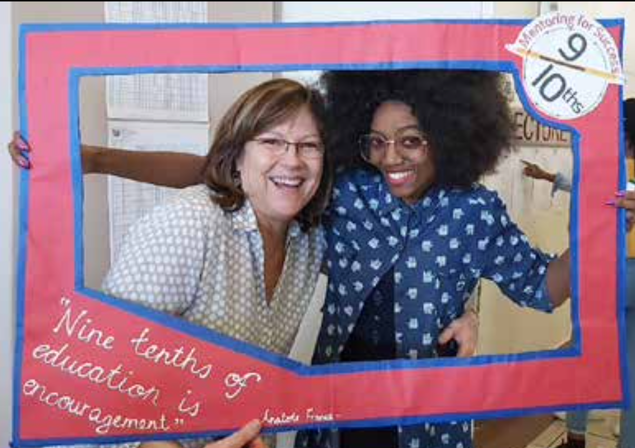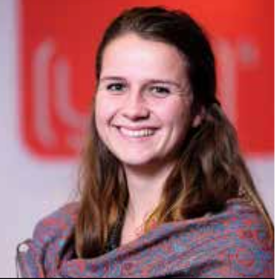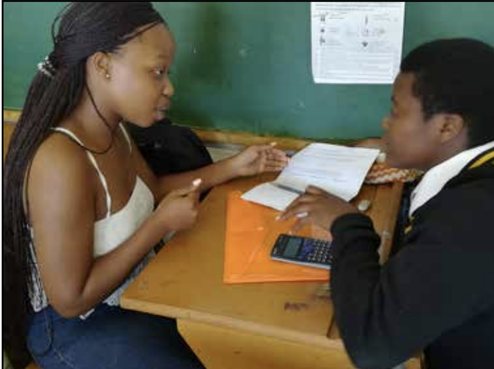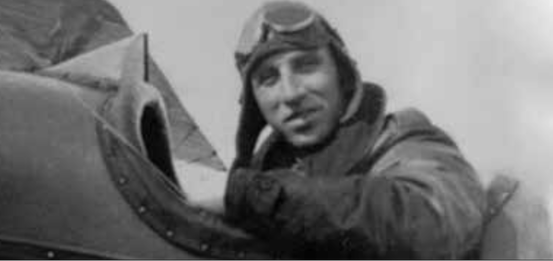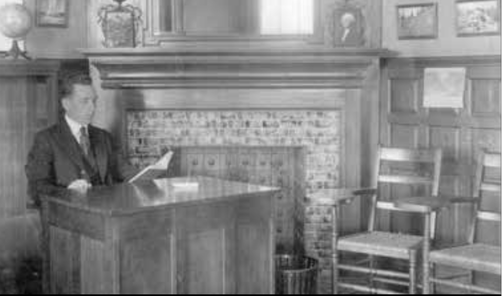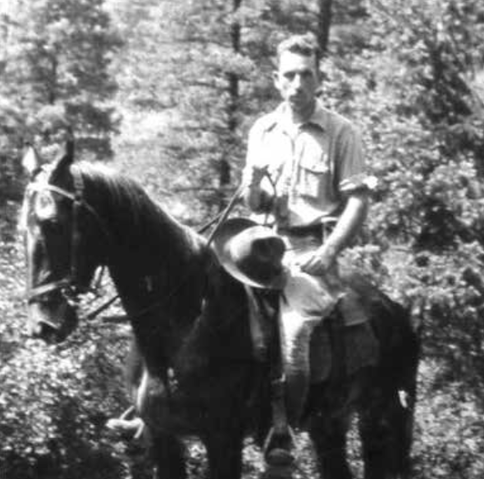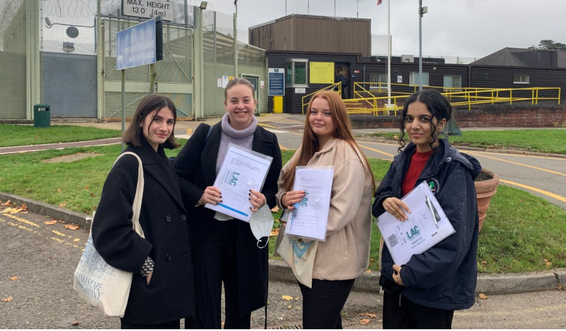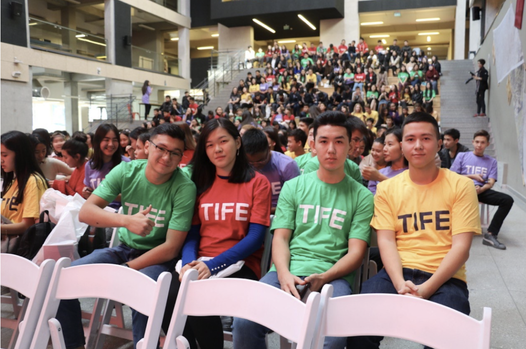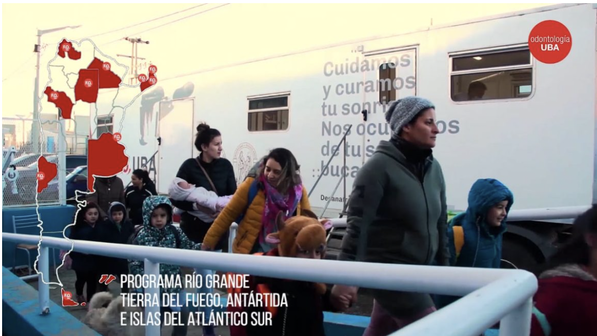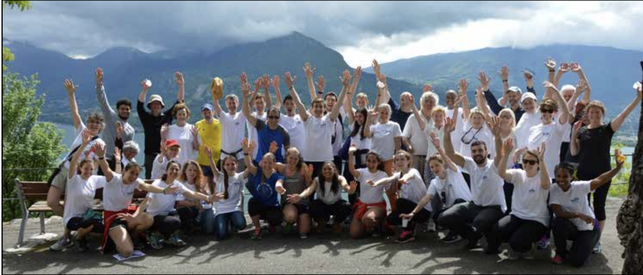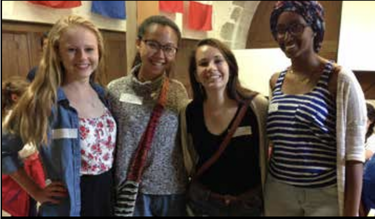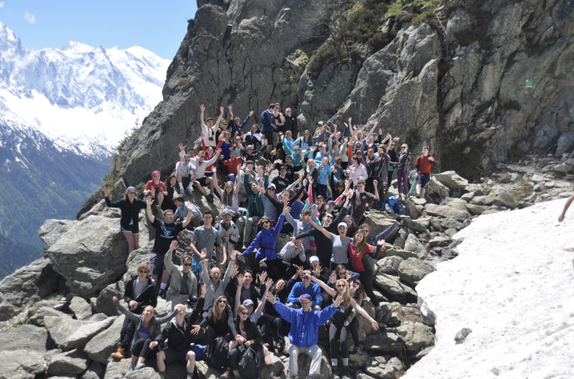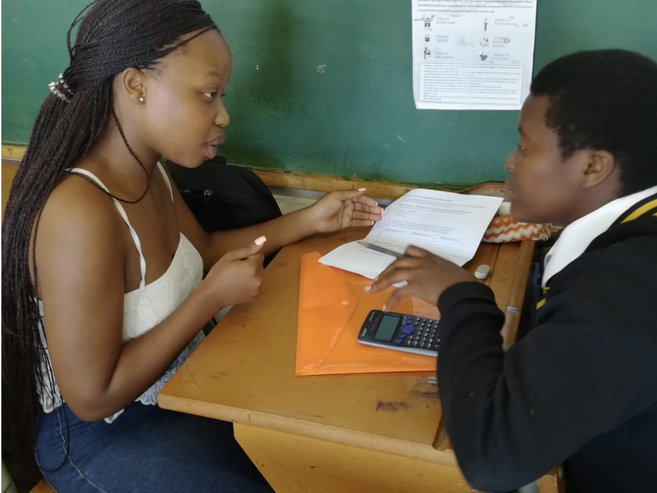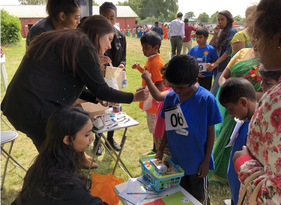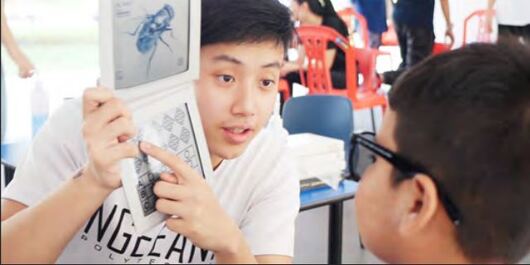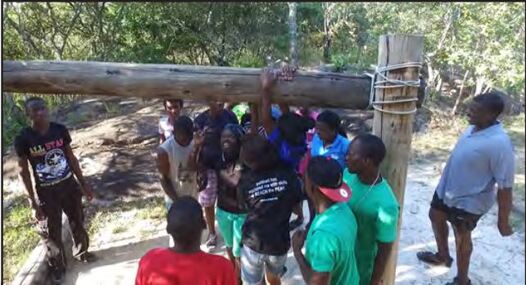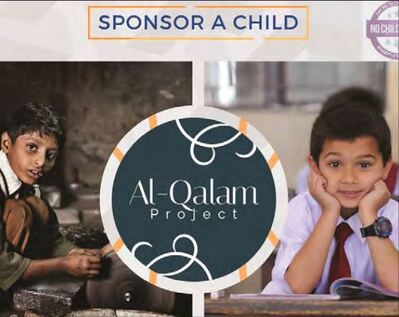
|
A self-made MacJannet devotee When Donald and Charlotte MacJannet donated the Prieuré in Talloires to Tufts University for a European campus in 1978, Rocky Carzo had been athletic director at Tufts for five years but had never set foot in France. Rocky was 50 when he first visited Talloires in 1982. Donald MacJannet, then 88, charged him with a special mission. “I want you to bring some life to this place,” Donald said. “They’re just doing academics. They’re not paying any attention to the rest of the body.” Thus began Rocky’s long relationship with Talloires and the MacJannet Foundation, as well as a series of idiosyncratic MacJannet-style traditions that survive to this day. The first of these was the MacJannet Games, whose events required not only physical prowess but also mental acumen and teamwork, not to mention a good grasp of local geography (one event was a relay race through the streets and hills of Talloires). At roughly the same time, Rocky started a “Tufts Alpine Fitness” class that evolved in 1982 into the annual St. Germain Pilgrimage, whose participants run, jog, bicycle, or drive cars up to the Benedictine monk’s chapel high up in the hills above Talloires. Although Rocky retired as Tufts athletic director in 1999 after 26 years, he remained active with both Tufts and the MacJannet Foundation almost up to his death this year on January 16 at age 89. As perhaps the only member of the MacJannet community who first encountered Donald and Charlotte in middle age, he brought a unique appreciation of their values. —Dan Rottenberg When the Olympics came I was the Tufts European Center’s director in the late 1980s when Albertville was chosen as the site of the 1992 Winter Olympics. Since Albertville was just a half-hour drive from Talloires, I immediately began plotting a way to involve the Prieuré. Rocky Carzo, then Tufts athletic director as well as a member of the European Center faculty each summer, became my natural ally. With the University’s support, he and I made a special trip from Medford to Talloires to meet U.S. Olympic Committee members and host them for several days of visiting Olympic sites and introducing them to the Prieuré. As a result, the committee members chose the Prieuré as their official headquarters, and the people of Talloires opened their hearts and hotels and restaurants to U.S. Olympic athletes and their families. Rocky and several current and former MacJannet Foundation trustees were on hand for the Olympics, and the town of Talloires was featured worldwide during the extensive mass media Olympic coverage. —Mary Harris ‘You can do it’ In the realms of “mind, body, and spirit,” Donald and Charlotte MacJannet championed physical well-being and athleti- cism— not to mention competition. Rocky Carzo bonded with them as an advocate for fitness and team building— a coach whose cause was the construction of character. His can-do spirit was infectious and inspiring. He helped us climb mountains by putting one foot in front of the other. Looking up at La Tournette, I can hear him saying, “You can do it; just take the first step.” —Tony Cook Common-sense counsel I met Rocky only after joining the MacJannet Foundation in 1996 but quickly came to have the highest respect for his honesty, straightforwardness and infectious personal warmth. I especially appreciated the close relationship and superb advice I enjoyed during my presidency of the Foundation, when he provided much needed common sense and wise counsel as I was trying to manage the Foundation’s transition to the post-MacJannet period. —John King Magic and electric He was a magic and electric personality. —George Halsey North Star Rocky was an indomitable spirit, a “North Star” for both athletes and colleagues. I remember his consistently wise counsel during my earliest days with the Foundation, when I worked to support Donald and Charlotte’s initiatives. His image stands alongside theirs when I think about their legacy of peaceful service. —John F. McJennett III Pepping up facility meetings Rocky truly reinforced the MacJannetness in all of us. And how many liberal arts colleges can say that their athletic director elevated the deliberations of arts and sciences faculty meetings on a broad range of topics, including academic policy? I wish I had some videotape of those marvelous occasions. We’d be mired in stuffy discourse; then Rocky would stand up and humorously break through our stilted nonsense, steering the professoriate to wiser decisions, always in the direction of trying to do a better job at educating the whole person. —Robert Hollister
1 Comment
A conversation with our first-place Mac Prize winners By AMY CARZO Editor’s note: Last year’s first place MacJannet Prize was awarded to the Nine Tenths Programme at Rhodes University in Makhanda, South Africa. Following the announcement in November, Amy Carzo of the MacJannet Foundation sat down with the program’s two administrators: Diana Hornby, the university’s director of Community Engagement; and Anna Talbot, coordinator of Rhodes University’s Community Engagement Office. Amy Carzo: How did the Nine Tenths Programme get started? Diana Hornby: When our vice chancellor, Dr. Sizwe Mabizela, was inaugurated in 2014, he said, “We are not just geographically located in Makhanda, but we are of and for the city.” It was a deliberate departure from the old ivory tower kind of image— to say that we do not live in isolation and we are inextricably bound and we are part of our community. After his inauguration, he made a commitment to work in public education, the local municipality, and to achieve Internet access for the city. First he set up a committee (including the dean of education and key community members) to look into how we might begin to transform public education in the city. In 2011, only nine people entered the university from the local community. By 2020, that number had grown to 120. In 2016, Makhanda was one of the four worst- performing school districts in the country; in 2020, results showed we were the best performing city in our province. We naturally started at the top end and created these matriculation programs to create that kind of impact and access to our university, because we can’t be a university that educates everyone else’s children and not our own. Once the Programme was in place, we started to see that many of the deficits we were dealing with were created in early childhood. One study showed that 80% of our city’s third grade children could not read for meaning. So we realized that it was futile just to work at the top end; we actually needed to go back to early childhood education. We couldn’t do that ourselves as a university; we had to bring everyone working in education in the city together. So we put together educators in primary, middle school, and high school, who previously functioned separately, to develop this pathway. Now we all see ourselves with the same goals, complementing each other and getting excited about it. Amy: What’s the meaning of the program’s name— “Nine Tenths”?
Anna Talbot: It comes from French poet Anatole France’s remark that “Nine tenths of education is encouragement.” So we really focus on mentoring, as opposed to tutoring, to give students that encouragement. We work with matriculating students in their final year of high school, to help equip them with the skills that will get them through that year. It happens in three phases: Phase 1 teaches them how to set goals. Phase 2 hones in on study techniques. Phase 3 creates guidance to set up a trajectory beyond school—something that is positive and engaging and worthwhile doing, once they leave school. These three phases occur across nine sessions at strategic points through the academic year. These sessions are one-on-one, matching one student volunteer mentor with one mentee, and last for about an hour each. Many of these student volunteer mentors join us in their second year at the university and continue through to fourth year. But that’s their decision. But we have quite a high retention among the volunteers, because of the relationships they form. And mentors often go beyond the planned nine sessions, meeting privately between sessions as well. Many of our volunteers come from very similar socio-economic circumstances and never had that support, so they appreciate its importance. And even though they are 17 or 18 years old, they connect much better with someone who is dealing with similar issues. This is the exact reason why we prefer student mentors over academics (although staff are allowed to become volunteer mentors too). What makes the program unique is that volunteers are not tutoring a subject; they’re imparting life skills. Some student volunteers who’ve matriculated within the past few years can pass on tips about writing exams, subject knowledge— that sort of thing. It’s more a big brother, little sister sort of familial relationship than a teacher relationship. Amy: What was Rhodes University’s original mission? Diana: The university was established in 1904. It’s a relatively small university, in a semi-rural town: Makhanda. Also, during apartheid, Rhodes was designated for whites only. There was strong separation between the university and the community at that time. After apartheid ended, in 1997, all universities were mandated to introduce community engagement. So at that point, the aim for the university was to play a much broader role in society. When we speak of the purpose of higher education now, we speak of two main roles: How do our academic projects contribute to social and economic development? And how do we grow socially responsible young people to be the change agents that our civil society needs? And you can see that in our numbers: Almost 50% of our 8,500 students are involved in some community engagement. And almost half of those are volunteers. Amy: What’s it’s like for a typical student who participates in the program? Anna: Before the mentors work with the learners, our partner organization conducts training to teach them the skills that they will pass on— like being able to regulate and take control of your own learning. Most of Makhanda’s schools are located in low socio-economic areas with very minimal/non-existent Internet access. So we’ve been really lucky that a local Internet service provider has installed Internet service in the schools, which has really made mentoring online much more accessible. Especially during COVID, we really had to think innovatively about how to build those relationships between mentors and learners. Now, with these Internet connections, you can have much richer experiences. We’ve also been able to increase the number of mentees/learners, because we don’t have to transport people back and forth. We’re not bound by the number of seats on a bus. Diana: I think for a lot of students, it’s all about the relationships. Our mentors have said being engaged in the program holds you accountable. The mentees push you to learn these skills because you have to teach them. There’s plenty of mutual learning as well. A lot of the mentors say, “We can’t tell the mentee how to use a timetable if we’re not using a timetable ourselves.” Things like that. There are also some bright young school kids who are capable of managing at university but didn’t get good enough marks for a bachelor pass (which is what you need to attend university). In those circumstances, we offer three options:a second chance schooling at one center called the Assumption Development Center; a standard matriculation school; or a “bridging year.” If their grades are not high enough to get into Rhodes, then we offer them the bridging year. We have a partnership with Gadra, a “second chance” school. For one year, these students take two subjects at Gadra and one subject at Rhodes. Then the following year, if they’ve passed the subject at Rhodes and they’ve improved on the other two, they’re automatically accepted into Rhodes. Amy: How is Nine Tenths funded? Diana: It was an unfunded mandate. We get funding from corporations and foundations. Our salaries are paid by the university, but the money we need to run programs needs to be found elsewhere. Amy: Can you share a story of a student who benefitted from the program? Diana: Zanele Toyisi was a mentee of our pilot program in 2015. The following year, she became a mentor and mentored people at her previous school. And a year later she became a student leader, mentoring mentors to work with the mentees. Now she is a teacher at our partner organization and a board member there as well. So she’s come through the full iteration of the program. And she’s thrived in that education space and it’s formed her career and who she’s become in the community. She studied environmental science, and now she teaches geography. Amy: Looking forward, what’s next? Diana: At the end of every year, we re-conceptualize the program, because there were areas left wanting. Then, last year, we realized the program is now running on oiled wheels. And we see the results in the impact data. So what now? Do we sit on this amazing model, or do we share it? We went to other universities and asked if they were interested. Two universities expressed interest, and in fact, the Talloires Network and winning the MacJannet Prize helped us enormously. And next year, we’ll be rolling the program out to two other universities. We feel we have a responsibility to share these models we’ve developed. It’s not about trying to sell it or benefit financially. We tell other colleges: Rather than everyone creating and learning from the beginning, here’s learning you can build on. Here’s something you can adapt to suit your circumstances. In that way, we can contribute to the global stock of knowledge by having mastered something and developed a model of excellence in our own space. If one child out of a family has a Rhodes University degree, that changes the circumstances of the whole family. A study by one of our units shows that 96% of Rhodes students are meaningfully employed in about a year after graduation. So students know now that the program is a pathway to success. With their efforts and a good degree, they can change not only their own circumstances but those of their whole family. They pull up the other children, who see them as their role models. The earning power of that one family member changes the circumstances for the rest of the family. It is true intergenerational change. Disappointment and failure marked Donald MacJannet’s post-college years. What changed? By HERBERT JACOBS In the spring of 1916, Donald MacJannet had just turned 22, a handsome, blue-eyed, persuasive young Lochinvar armed with a freshly minted bachelor’s degree from Tufts University, a jangling Phi Beta Kappa key, and a zeal to conquer the academic world. But the academic world, he found, was indifferent to his credentials. Private school recruiters said they were impressed by his academic record but cautioned him to contact them only after he had some teaching experience. His persistence paid off when he serendipitously encountered William H. Church, head of St. Albans in Washington, D.C., a prep school founded in 1909 as an Episcopal school for boy choristers at the National Cathedral. At the end of their lengthy interview, Church surprised Donald by asking, “Would you sign a contract to come to St. Albans in September, teaching lower school subjects—everything?” “I would be very happy to come,” MacJannet replied. “But would you mind telling me why you hired me at once, when all the other schools where I have applied demanded that I get some teaching experience first?” Church replied that when he arrived at St. Albans the previous year, “it had an experienced staff, but that staff was under the thumb of the athletic director. St. Albans was famous for its football team, basketball team, baseball team, and the athletic director ran the school. He told me what I should do and what I should not do, just as he told the other staff members. And I said to myself that I would have my own staff, men that I can train myself, and who will do what I think is the right thing to do.” Thus, thanks to the school’s overemphasis on athletics, in which he himself had been so inadequate, Donald started teaching in Washington’s leading preparatory school, most of whose students were the sons of high-ranking government officials. Two were Elliott and James Roosevelt, sons of Franklin D. Roosevelt, then serving as undersecretary of the Navy under President Wilson. When Eleanor Roosevelt drove to the school in her Model T Ford to pick up her sons, Donald (who taught Elliott Roosevelt but not James) often assisted Mrs. Roosevelt by cranking her car (Fords were not yet equipped with self-starters). It was perhaps the first example of Donald’s knack for cultivating friends in high places. Mrs. Roosevelt amply repaid all that Ford cranking a quarter-century later, when as First Lady she helped Donald obtain financing after he turned over his camp on Lake Annecy in France to house French war orphans during World War II. Jonathan Daniels, son of Navy Secretary Josephus Daniels, was also enrolled at St. Albans. Neither he nor Elliott Roosevelt did very well as students, MacJannet found, though Daniels later performed ably as editor of his father’s newspaper, the Raleigh (N.C.) News and Observer. Unruly students Donald’s lack of teaching experience soon became evident when he encountered difficulties maintaining order in his classroom. His boys would throw things and yell, to the point where the mild-mannered next-door teacher protested. At a time when teacher guidebooks were unknown, Donald was at a loss until Headmaster Church came forward. Usually, Church suggested, just one boy was the bad actor: “Take him up to the classroom with you when it is empty and you are preparing lessons or reading,” Church said. “Have him sit in a corner, facing the corner, and go ahead with your work. Don’t speak to him. Let him just meditate there. If you do that for a few days, he’ll be quite different.” Donald tried this remedy and found that it worked. Since he was already philosophically opposed to physical punishment, bullying, and violence in education, Donald made this practice one of his principles when he opened his own school nearly a decade later. Donald’s salary that first year was $800, plus room and board and free laundry service— up to 21 pieces of laundry each week, with each sock and handkerchief counting as one piece. Two critical lessons When his contract was renewed (at $900) for the second year as head of the school’s French department, St. Albans sent Donald to the Harvard summer school to brush up on his French. For the rest of that summer of 1917 he became hut master for the Appalachian Mountain Club at the organization’s hut on Mount Madison, in the Presidential range of the White Mountains. Here he cooked simple meals for the climbers scaling the rugged slopes. One guest at the hut, Dr. A. A. Crane, had just returned from the World War battlefronts in France. The U.S. had formally entered the war in April, 1917, and American industry was busy producing armaments for the Allies, but Donald had absorbed the prevailing view among his fellow St. Albans teachers that this was “Wall Street’s war.” Crane’s descriptions of the fighting, as well as the threat posed by a German victory, changed Donald’s view. Able-bodied American men like himself, he began to feel, had a duty to join the war effort. The prospect of a free trip to France reinforced those feelings. Meanwhile, back at St. Albans, Donald was commandeered against his will to direct a student variety show to raise money for a war charity. Throughout the preparations, he agonized that the whole venture would fail abysmally. The variety show’s subsequent success brought him no satisfaction— only the fear that he would be saddled with more such tasks in the future. Profanity in the barracks That fear may have provided the final push that caused Donald to tell Headmaster Church late that fall of 1917 that he planned to volunteer for the U.S. Air Service, then a branch of the Army Signal Corps (at a time when America had no separate air force). Church appealed to Donald’s conscience: “You can’t leave the students in the lurch,” he said. “At least you must stay with the school until you are actually called into service.” Donald agreed, so every week he told his classes, “This is perhaps my last week, so let’s make it a good one.” But as the weeks wore on, this plea to the students wore so thin that Donald had to discard it. He wasn’t called to active duty until mid-June of 1918. When Donald received the Army’s telegram to report for aviation ground school training at Princeton, N.J., he stepped into a new and, for him, shocking world. After two years in the refined atmosphere of St. Albans, with its morning and evening chapel, he was horrified by the barracks profanities of military trainees. “They were all college men,” he later recalled, “but they had a vocabulary that shocked me. At first I was quite turned off from them. But I soon found out that they were wonderful fellows, and I forgot their language.” Instead of France, Oklahoma By this time, the German drive on Paris had been halted, and the subsequent infusion of fresh American troops was beginning to turn the tide of the war in the Allies’ favor. Of the 200 recruits who entered the class with Donald, only 54 survived the cuts. Donald finished the ground training course as head of the class in all divisions. The new cadets were transferred to an Army camp in Dallas, Texas, where Donald and his group found themselves quartered at the agricultural fairgrounds, in the section reserved for prize hogs. Here their biggest concerns were the boredom produced by constant drilling, and the fear that the war would end before they could reach France. The word passed down from the higher-ups was that any airman could get to France in a hurry if he volunteered to go as an observer. MacJannet and some of his colleagues promptly volunteered. Soon they found themselves on a military shuttle train that took them to Fortress Monroe in Virginia to train in handling heavy artillery. They were still at Fortress Monroe on November 11, 1918, when the Armistice ended any hope of their seeing France. Instead, the group was transferred to Post Field, Oklahoma, a forlorn place where pedestrians crossed the muddy streets on stone boats hauled by oxen, at a dollar per crossing. Here the trainees performed light artillery work and Donald received one silver wing, certifying him as a trained observer. But nothing more. First flight Then these flying enthusiasts decided to take training as aviators. At a pleasant stretch in Memphis, they roved the countryside on weekdays, loading crashed planes on trucks to be hauled away. Among these fledgling pilots was Ralph Damon, who remained a friend of Donald years later when he became president of TransWorld Airways. Next the trainees were shuttled to Carlston Field, in Arcadia, Florida. Here Donald found himself badgered by a savage instructor who repeatedly assured Donald that he would kill himself because he was such a terrible pilot. Coached by a friend, Donald improved until the instructor begrudgingly asked Donald for a handkerchief, which he affixed to the plane’s tail, signifying, “Pilot starting first solo flight. Give him a wide berth.” Soon Donald completed the necessary work for his second wing. But with the war over, and no academic job available so late in the session, he had to remain in the service for several more months. At this point Donald was stricken with the Spanish influenza epidemic that swept the U.S. and Europe in 1918. In a roomful of 40 other victims, where the chief remedies seemed to be Epsom salts and whiskey, he nearly died. Scrambling out West In March, 1919, MacJannet, now a reserve second lieutenant, and a comrade with the same rating set off, resplendent in their uniforms and glistening aviator’s wings, to tour the American West. When their money ran out en route, Donald took a job harvesting wheat in the Great Plains, which he found much more rugged than piloting a plane (although he found the $10 a day pay fabulous). After resigning as a harvest hand, he journeyed to Colorado, where he found work as a chef at Pike’s Peak, a job that entitled him to call himself “the highest paid chef in the world.” Later that summer Donald moved on to Yellowstone Park in Wyoming, where he ran a team to haul wood and ice and fetch hot water from Old Faithful. Returning to St. Albans in September, 1919, Donald encountered both the benefits and drawbacks of postwar inflation. His pay increased to $1,200 for the year from the previous $900, but he had to replace the civilian clothing he had auctioned off when he joined the Army Air Corps. A new suit, he discovered, would cost $100. To pay for it, as well as other expenses, he obtained the football schedules of nearby colleges and arranged to print them on 2,000 desk blotters. He sold the blank squares next to the football schedules to Washington department stores for advertising, rented a motorcycle and sidecar, and delivered the free blotters to the college campuses. Opportunity, or scam? With his school’s approval, Donald arranged to leave St. Albans at the end of the 1919-20 academic year to seek further training in French at the Sorbonne in Paris. His last year at St. Albans— teaching French, German, and English— passed smoothly, and he was gratified when, at the end, all his students fared well on their college board exams. In the spring of 1920 Donald noticed an advertisement placed by a teacher in an Eastern private school. The man sought assistants to help guide a group of college students through Europe, but he demanded $1,750 for this privilege. When Donald wrote that he had only $400, the promoter agreed to take him for that amount, which should have aroused Donald’s suspicions. At the New York rendezvous that July, Donald and the students found that the promoter had switched ships and signed up with a tour agency in order to save money. For the English segment of the tour, the tour agency provided three aged taxis at Southampton; but two of the cars broke down near the end. The promoter frequently disappeared and finally vanished altogether in Rome, having reimbursed Donald’s $400 fee in depressed Italian lira, which brought Donald less than $300. Fortunately for the 13 students, Donald had their return boat tickets in his own possession. In Genoa he found a ship for them to return on. But he had never bought a return ticket for himself. After seeing the students off, Donald took a solo sightseeing tour through Italy, Germany, Belgium, and Holland before arriving in Paris in time to register for the Sorbonne’s two-year course for potential instructors in French. Donald presumed that this course would lead to a teaching post in some American college. Instead, it led to a career as an educator in France that would last— with only a World War II interruption— for more than 60 years. Excerpted and edited from Educator of Kings, the biography of Donald MacJannet. 2022 First Place Winner: Queen Mary University of London Legal Advice Centre (QMLAC), Queen Mary University of London (United Kingdom) The Queen Mary Legal Advance Centre (QMLAC) is a free community law centre based in the University’s Law Department. It brings together undergraduate law students, QMLAC staff and volunteer qualified lawyers to provide free legal advice services and public legal education initiatives to the local community. It embodies the University’s own history, one with its roots as the People’s Palace – designed to improve the lives of poor communities in London’s East End, through cultural and educational opportunities. The university continues this educational mission today, using public engagement and service in its daily work. This work has been recognized with the award of a Platinum Engage Watermark from the National Coordinating Centre for Public Engagement. The location of the QMLAC is a vibrant and multi-cultural area, but one which has significant poverty and need (East London is regularly the lowest scoring area in the Trust for London’s, ‘Poverty Profile’). The Centre was founded by the Law School in 2006 to meet a need for the community to have access to free legal advice. It was the first law clinic of its kind at a London university. It provides free client-centred 1-2-1 legal advice (and sometimes representation) to the public as well as community-based public legal education projects. Qualified volunteer lawyers supervise all work and legal advice delivered by law students. Student opportunities are both curricular and extra-curricular. The clinical legal education aspect of the centre’s work is providing students with ‘real life’ experience with assisting people who are in need of access to justice, and ensuring they understand and develop a lifelong commitment to the value and importance of pro bono work, for them personally, as well as the wider community. It is a symbiotic relationship where students and clients benefit from engaging with the other. The QMLAC team has 8 members of staff (funded by the University), in addition to the students and lawyer volunteers. The QMLAC has a volunteer External Advisory Board made up from volunteers in the legal sector, and an internal QMLAC Management Committee comprised of academics within the Department. This ensures proper and appropriate governance and accountability. The Centre is founded on the principles of excellence, integrity, and ethics. All student opportunities have concurrent reflection classes. QMLAC teaches the ethics of lawyering and instills in students the importance of the special two-way process that they are learning and developing through the opportunity the clients give them to provide legal advice. “It is such an honour to receive the prestigious MacJannet Prize from the Talloires Network. We want to acknowledge all the volunteer lawyers, and students who donate their time to the work of the Queen Mary Legal Advice Centre; and all the clients who work with us through some of the most vulnerable times of their lives. Queen Mary University of London has built a proud culture which champions civic engagement. Without the continued support of the University and Law School, the mission and work of the Queen Mary Legal Advice Centre would not be possible. We will continue to strive towards enabling access to justice for all educating our future lawyers in the importance of pro bono and community service.” - Frances Ridout, Director of the Queen Mary Legal Advice Centre 2022 Second Place Winner: Teenagers in Free Enterprise (TIFE), American University of Central Asia (Kyrgyzstan) The goal of the TIFE project is to create a platform for high-potential high school students and facilitate the development of entrepreneurial skills. TIFE strives to solve the problem of an unequal distribution of income and opportunities between different groups in society. More than half of Kyrgyzstan's population is under the age of 25, and almost a third of the population is between the ages of 15 and 25. Young people in Kyrgyzstan live in an environment where poverty and unemployment are widespread. This has a negative impact on more than 40 percent of young people: economic opportunities are very limited, access to public services is insufficient, and corruption is rampant. This makes 31 percent of young people "fear the future or be unsure of the future." The TIFE program consists of two parts: Education and Competition. During the educational part of the program, teams of high school students participate in training sessions about business modeling, design-thinking, financial modeling, and also meet with the business owners. In the competition portion of the project, teams compete to win the TIFE annual competition where one of the most valuable prizes is a 35% discount on tuition fees at the American University of Central Asia in the total amount of $34,600 for 6 TIFE winners. “We are deeply honored to receive the MacJannet Prize for Global Citizenship! Thank you for the opportunity to become a part of Talloires Networks projects and for recognizing the exceptional student community engagement activities within the American University of Central Asia initiative. This award brings a big contribution to the TIFE Accelerator and its development!” – TIFE Program Staff 2022 Third Place Winner: UBANEX, University of Buenos Aires (Argentina) The UBANEX Program was created in 2004, in response to the need for an adequate reference framework for university extension activities carried out at the University of Buenos Aires, defining University Extension as a communicational, educational, cultural and scientific process that articulates teaching and research, and makes possible a transformative relationship between university and society. The University, through university extension and in connection with teaching and research, makes its knowledge available in order to contribute to improving the quality of life of the members of its society. Through the program, a policy scheme was developed that promotes, values, and disseminates the link between the university and the community, creating new knowledge spaces to contain the complexity of the demands of the social environment, assuming the responsibility to interpret, participate, and provide responses in a field of excellence. The program aims to stimulate social intervention with pre-designed devices, in dialogue with community social actors in the territory and area of influence of the University. These interventions are distinguished by being actions that benefit the target populations and accompany the design, articulation and reformulation of public-social policies with various state and private entities, and that, in all cases, train students guided by teaching teams. “The University Extension and Student Welfare Secretary of the University of Buenos Aires is infinitely grateful for the award given to our Program. This prioritizes and strengthens us to continue growing and encourages our students and teachers to continue along this path, trying to grow every day in order to contribute to improving the well-being of our society.” - Galli Gustavo J. "It is an honor to receive this distinction, from our team of teachers and students we are fully grateful, this gives us strength to continue serving the community more and better every day." - Carlos Capuano 2022 Honorable Mentions INTEGRA: Programa de integración universitaria para jóvenes refugiados, Universidad Camilo José Cela (Spain) The goal of Proyecto INTEGRA is to facilitate the transition and acclimation of refugees entering Spain and to provide support due to the uncertainty of young refugees and their families when facing the challenges of integration in a new society. The program offers opportunities for development by providing professional job training, access to higher education, and promoting an inclusive and supportive mentality as well as critical thinking among the rest of the academic community that makes up the university ecosystem. The Code4All Initiative, Ashesi University (Ghana) The Code4All Initiative is a student-founded and led program that aims to empower high school students from underserved communities with software development and critical thinkings skills, thus preparing them to solve real-world problems using the power of technology. The Initiative provides mentorship and teaches basic computer skills and problem-solving through programming to students from rural and underrepresented backgrounds. The NORTH (Navigating Ottawa Resources To Improve Health) Clinic, University of Ottawa (Canada) The NORTH Clinic is an interdisciplinary, student-run clinic at the University of Ottawa that aims to understand underserved clients’ self-identified social needs and address them by connecting them to tailored community resources and supports. Through collaborative efforts between students and medical, legal and social work professionals, the NORTH Clinic also aims to train and equip future professionals with the tools to competently and confidently intervene on the social determinants of health. Special thanks to the International Selection Committee:
Senathirajah Ariyaratnam - Professor of Dental Education and Global Oral Health and Lead for Responsibility in Dentistry and Global Oral Health Initiatives (2021 MacJannet Prize Winner), University of Manchester (United Kingdom) Luz Avruj - Coordinator of Institutional Relations and Networks, Latin American Center for Solidarity Service-Learning (Argentina) Peter Kirira - Principal, College of Graduate Studies & Research and Senior Lecturer, Mount Kenya University (Kenya) Cliona Maher - Latin American Officer and Vice-Chair of the Latin American Regional Working Group (LARWG), University College Cork (Ireland) Claire McCann – Student and Program Coordinator of Nine Tenths Programme (2021 MacJannet Prize winner), Rhodes University (South Africa) Catherine Parrinello – Trustee, MacJannet Foundation Board Achyuta Samanta – Founder, Kalinga Institute of Industrial Technology (2021 MacJannet Prize Winner), (India) Wenke Thoman – Vice President of Development, MacJannet Foundation Board December 18, 2021
Dear Friends of the MacJannet Foundation, At the close of a year when health, economic, and political calamities rippled across the world, I find myself once more reflecting on the vision of a kinder and more self-confident world that Donald and Charlotte MacJannet promoted through their commitment to education and cultural exchange. For the second straight year, the coronavirus pandemic forced the temporary suspension of the two international cultural exchange programs we customarily support: The Tufts University European Center in Talloires, France; and Les Amis du Prieuré of Talloires. Yet remarkably, our newest program—the MacJannet Prize for Global Citizenship—was able to continue its 12-year tradition of honoring exemplary university student civic programs around the world. It has become a driving force behind the global Talloires Network of Engaged Universities, which is itself the driving force behind a revolutionary idea currently sweeping the academic world: that universities should venture beyond their cloistered towers to grapple hands-on with real-world issues. In these 12 years, more than 525 civic engagement programs on six continents have applied for the Prize, and 64 of them— in 26 countries around the world—have been honored as Prize-winners or honorable mentions. The Prize has set the standard for what can be accomplished when students and faculty harness their skills to improve the lives of their fellow citizens. Today our great challenge is to maintain and expand the MacJannet legacy for the next generation. The astonishing success of the MacJannet Prize even in these trying times suggests to me that we are up to the task of inspiring the lives of young people who may one day change the world for the better. The indefatigable optimism of Donald and Charlotte MacJannet inspired generations of young people throughout some of the darkest years of the 20th Century. Today it is up to us to plant seeds in the hope of build a better world, just as they did. We thank you for your past support and urge you to increase it in this time of crisis. Just ask yourself the ultimate MacJannet question: “How can we help?” In practical terms, how can we help restore the Foundation’s worthwhile programs so they evolve stronger and better? To make a donation, click here. Thanks so much. With your support, 2022 can be a brighter year for everyone. Anthony Kleitz President The MacJannet Foundation While there were no students in Talloires during the summer of 2021, below is a collection of reflections from past years reminding us of the valuable lessons and personal growth that can occur when we explore new cultures. We look forward to the day when students will have that opportunity again. Three lessons from french culture Some things that I picked up from my host family:
Walking in the rain The very first week I was here a group of students and I missed the bus and decided to walk from Veyrier to Talloires. Ordinarily, walking an hour and a half in the rain would have made me somewhat miserable, but due to the people I was with and our shared enthusiasm, this walk was one of my most memorable experiences. We shared life stories, swapped jokes, and later that day we got to brag to everyone that we’d walked four and a half miles to school in the pouring rain. After that day I made a point of walking to school with one of my friends from Veyrier du Lac at least once a week. Tala, Class of 2016 Discovering my best self Not only did I have amazing experiences, but also I be- came my best self. I believe that I am now more confident, positive, and appreciative of everything I am and have. Tufts in Talloires is like an amazing hidden gem that some don’t know about, but that blesses those who do with its beauty and all the unbelievably incredible things about it. Matea, Class of 2018 At home with my hosts I was caught off guard at how at home I felt with my host family. Through living with them, I was able to gain more personal insight into what family means to me. I learned more about love, laughter, and excitement. Home has never been a place of excitement for me, but through camping, making s’mores, and playing riddles, I realized that I could find it through my host family. It felt refreshing that I could go back to a house filled with white people and still be my black Muslim woman self. Muna, Class of 2019 A life-changing experience If there were one person that I can attribute most of my improving French vocabulary to, it would be my host sister, Justine. I spent a lot of time with her, jumping on the trampoline, drawing pictures, and playing card games. I pointed to things and she taught me the word, and I did the same for her in English. From my experience, I have found that children have this unique ability to get along with anybody, regardless of race, language or religion. At the Kids’ Day, I had so much fun painting faces and learning the words for all of the things I painted. We could not explicitly communicate with words, but smiles and laughs and gestures were all that was needed. One thing that I cannot get over here is the absolute beauty of my surroundings. When I go for runs in the evening and see the orange and pink sun setting behind the majestic mountains and reflected on the brilliant blue lake, it literally takes my breath away. A few weekends ago, our group took a day trip to Chamonix and hiked through the mountains. Coming from Florida, which is unbelievably flat, being amongst mountains was such a new experience. I loved that I had the opportunity to hike throughout the trails and see snow, even though it was late May and quite warm outside. My experience hiking Mount Blanc has made me want to try more adventures in the outdoors. Both classes that I am taking—environmental economics and nuclear France in a warming world—have shown me how much trouble our world is currently in, but have made me want to do something about it. Rather than take the pessimistic view, my professors have shown optimism and hope and that we are the ones who can change things and make a difference. Being given the opportunity to come to Talloires has been the most life-changing experience for me, and I’m truly grateful to be given this chance. Rebecca, Class of 2011 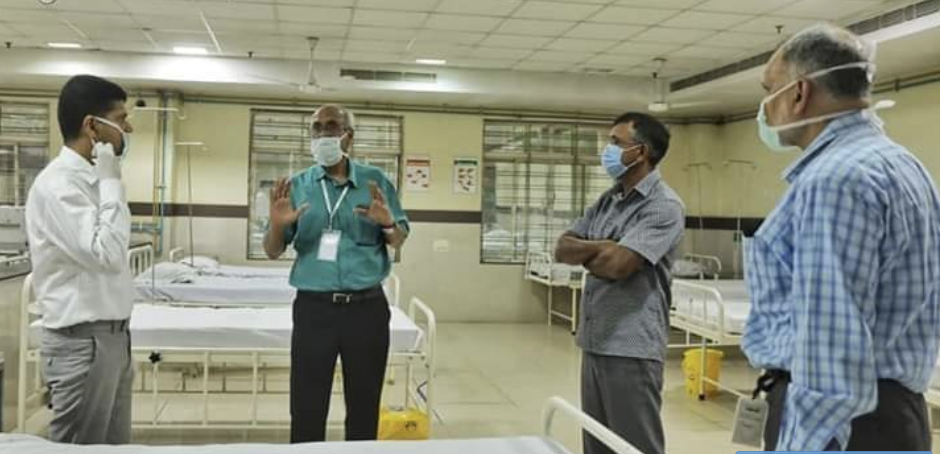 Second Place: The Act of Giving program which includes students from the Kalinga Institute of Industrial Technology and the Kalinga Institute of Social Sciences in India. Second Place: The Act of Giving program which includes students from the Kalinga Institute of Industrial Technology and the Kalinga Institute of Social Sciences in India. The Talloires Network and MacJannet Foundation are pleased to announce the winners of the 2021 MacJannet Prize for Global Citizenship. Following a review of 28 nominations from 15 countries by the Secretariat, the prize winners were determined after a Selection Committee of leaders in higher education civic engagement reviewed the 10 finalists from 8 countries. First Place: Nine Tenths Programme (Rhodes University, South Africa) The Nine Tenths Programme is the First Place winner of the 2021 MacJannet Prize. Born out of the need to address the unequal education sector in Makhanda, Nine Tenths provides mentorship and increased access to education to improve pass rates of local no-fee schools. Nine Tenths is co-managed by the Rhodes University Community Engagement Division (RUCE), local high schools and a local Non-profit Organisation, GADRA Education. Programme responsibilities are carried out in a participatory manner by each partner based on their skill set and resources. Student volunteers apply to be part of the programme and are put through a rigorous training programme. Student leaders are elected, who each take responsibility for 14 volunteer mentors. These leaders are critical as conduits of information and quality assurance of sessions. The program strives to revitalize education in Makhanda, enhance access to tertiary education and equip young people to transform their socio-economic status. The success of the program is evident in the increasing pass rates of university entrance-level exams, which have seen annual increases of approximately 30 Bachelor-level passes, with “program participants delivering at least 80% of all Bachelor-level passes produced by the six local schools.” “Our University is deeply honoured with this tremendous recognition by the Talloires Network with the 2021 MacJannet Prize for Global Citizenship. This award is a fitting tribute to our students who recognised the deep inequality in our city and through University Community Partnerships have made a profound impact on the lives of young people. As engaged citizens, these university students are not just content with seeing our society or the world as it is but can imagine a better society and better world and are prepared to work with courage and compassion towards a more just, humane, a more equitable, and a more inclusive and compassionate society. This Award serves as inspiration to our community to continue to find each other, strengthen partnerships and drive broader social change.” – Dr. Sizwe Mabizela, Vice Chancellor “What a tremendous honour it was to receive the news that we had won the prestigious award for Global Citizenship, the MacJanet Prize from the Talloires Network. We acknowledge the passion and commitment of our partner organisation, GADRA Education, the participating High Schools and the student team leaders and volunteers. We also acknowledge the important mandate made by Higher Education post 1994, to infuse community engagement into teaching and research as part of transforming Universities in South Africa. The support provided by our senior management to put this mandate into effect for the benefit of our community partners and university students is celebrated with this Award.” – Ms Diana Hornby, Director of Community Engagement. Second Place: Art of Giving (Kalinga Institute of Industrial Technology, India) The Art of Giving program strives to share the spirit of generosity and kindness to their community and the world in order to address a variety of societal issues. The program offers resources and student-led initiatives to improve access to inclusive education, support gender equality, uplift indigenous communities and promote sustainable development. The Art of Giving program staff write that it, “acts as a bridge between students and the indigenous community. Students need to understand and empathize with the problems which exist outside the four walls of their university.” The program also partners with local community leaders who act as “change makers” and are one of the pillars of the program. “I feel honoured that the Art of Giving has won Second Place for the 2021 MacJannet Prize for Global Citizenship. I would like to express my special thanks to the Selection Committee. It inspires us to continue our civic and community engagement work.” – Dr. Achyuta Samanta, Program Director and Founder of KIIT and KISS Third Place: Humanizing Healthcare (University of Manchester, United Kingdom) Shortlisted for the MacJannet prize in 2018, the Humanizing Healthcare program began as “Humanizing Dentistry” and has since expanded to the fields of optometry and pharmacy. This project aims to expand the role of civic engagement in the healthcare field and curriculum and is “based on the premise that we cannot create excellent healthcare professionals of tomorrow without creating engaged ones.” Students lead programs and deliver free health services to communities including refugees, asylum seekers, LGBTQ+ community members, and native non-English speakers, aiming to break down the barriers to healthcare that these communities often face. “In pioneering the ‘Humanising Healthcare’ program concept, we have successfully interwoven service learning pedagogy into the health care curriculum and positively interlocked the student learning experience with helping to combat health inequalities in Manchester and further afield. We sincerely thank the Talloires University Network for recognising our students’ achievements which is very much in alignment with Social Responsibility, one of our University’s strategic goals.” Dr. Raj. Ariyaratnam, Program Lead. Honorable Mentions: Penggerak Pendaulat Borneo 4.0 (The National University of Malaysia, Malaysia) The Penggerak Pendaulat Borneo 4.0 (PPB 4.0) program addresses the lack of electricity, clean water resources, and education in its local rural communities. Among the services offered in the PPB 4.0 program are a comprehensive clean water supply through the River Harvesting project and water filters installed in Kampung Lumampau. This program addresses changes in climate, geographical structures, and weather that affect the way of life of local communities who rely on the river as a main source of water. Additionally, “PPB 4.0 aims to increase awareness of the rural community towards education” regardless of the location, socio-economic level, and ability level of students. Positive Psychology and Wellbeing Research Lab (Effat University, Saudi Arabia) Founded by Dr. Saddiga Jaber Al Ghalib at Effat University, The Positive Psychology and Wellbeing Research Lab specializes in the scientific study of applied positive psychology and wellbeing. Responding to negative attitudes toward mental and psychiatric illnesses, the program notes, “We envision a world where conversation about mental health or seeking assistance for mental illnesses is no longer taboo or controversial.” The program has published articles, hosted informational events, and provided free counseling and support sessions during the pandemic. Penitentiary Program “Don Bosco” (Universidad Católica Silva Henríquez, Chile) The “Don Bosco” program provides access to education and professional training to incarcerated people through a variety of programs including literacy workshops and a Manual for Adult Literacy written by UCSH students, along with an effort to destigmatize Persons Deprived of Liberty (PPL). “Through visibility, awareness, reflection, and the generation of socio-educational actions, the program aims at the development of autonomy and critical capacity and decision-making for people deprived of liberty and freedom.” The Talloires Network would also like to recognize the impactful work of all of the finalists for the 2021 MacJannet Prize and we thank all of the nominees. We would also like to thank our international selection committee. Dear Friends of the MacJannet Foundation,
This past year posed the ultimate challenge for followers of those indefatigable optimists, Donald and Charlotte MacJannet: How do you build a better world in the midst of a global pandemic? The bad news you already know. The coronavirus has taken more than 3.7 million lives around the world and shattered millions more. Hospitals were overwhelmed, businesses closed, food lines swelled with the growing ranks of unemployed. Here at the MacJannet Foundation, the pandemic forced the temporary suspension of the two international cultural exchange programs in 2020 that we customarily support: The Tufts University European Center in Talloires, France; and Les Amis du Prieuré of Talloires. In such uniquely trying times, you may ask, how can a small foundation like ours promote the essential values championed by our founders: tolerance, resilience, and cross-cultural understanding? Now for the good news. Our newest program— the MacJannet Prize for Global Citizenship— was able to continue its 11-year tradition of honoring exemplary university student civic programs around the world. And the arrival of the vaccine for COVID-19 has brought hope of better times in 2021 for the world as well as our programs. While many others reacted to the COVID-19 crisis by cutting back or hunkering down, we responded by asking ourselves: “What would Donald and Charlotte do?” To us, the answer is clear: They would ask, “How can we help?” Donald and Charlotte survived two world wars and the Great Depression. They fled German-occupied France in 1940 with barely the clothes on their backs. Donald even contracted the deadly Spanish influenza of 1918 and nearly died, but lived to tell the tale. Nothing they encountered could sway them from their determination to build a better world by planting seeds in the hope that some of them would bear fruit. Instead of cursing the darkness, they lit candles. That is what we do aim to do today— to inspire the lives of young people who may one day change the world for the better. Thank you for your support of the MacJannet Foundation. Anthony Kleitz President MacJannet Foundation The MacJannet Prize for Global Citizenship, launched in 2009, recognizes exemplary university student civic engagement programs around the world. Today the Prize is a key element in the MacJannet Foundation’s work to build a community of global citizens. The Prize is sponsored jointly by the MacJannet Foundation and the Talloires Network, a global association of 417 universities in 79 countries on six continents, all committed to developing student leaders who are actively engaged with society. In addition to providing international recognition to outstanding student initiatives for civic engagement and community service, the Prize provides a financial contribution and encourages communication among the groups to share their experiences and strengthen their effectiveness. In 2020, the deadline for Prize nominations coincided with shutdowns on many campuses due to the global coronavirus pandemic. Nevertheless, the competition received 19 nominations from 14 countries across six contents, only a slight decrease from the number received in 2019. Of these nominees, three were awarded prizes last June by a selection committee consisting of respected educators from member universities of the Talloires Network as well as representatives of the MacJannet Foundation. Three others were recognized for Honorable Mention. Producing ‘big-hearted students’ First Prize ($7,500): Service-Learning Programme, Ngee Ann Polytechnic (Singapore) Ngee Ann, a university with 14,000 students in nine schools, launched Service-Learning in 2016 as its signature pedagogy, becoming the first tertiary institution in Singapore to strategically integrate service learning into its core curriculum. All Ngee Ann students participate in at least one Service-Learning activity or project, tied to an academic module, applying the skills and knowledge from their course of study to address community issues. The program seeks to produce what it calls “big-hearted students who are passionate learners and globally smart professionals, while making a positive impact on society.” The program’s more than 400 instructors consult and work with community partners to ensure that projects meet identified community issues while achieving the courses’ academic goals. The projects cover a broad range of areas, such as education, employability, elder care, health, environment, and community development. Students are encouraged to play a role in shaping their projects. From 2016 to 2019, more than 16,800 Ngee Ann students participated in some 150 projects involving more than 70 partners. They can also continue ServiceLearning in their final year through civic internships (an option chosen by more than 500 students in 2019) and some 25 international community projects (which attract more than 600 students annually). With the arrival of Covid-19 in 2020, Ngee Ann had to quickly pivot to eService-Learning. Information sessions were held to help faculty re-design their projects so they could be carried out remotely. More than 20 ServiceLearning projects operated in the April 2020 semester. Some students embarked on projects to tackle Covid19-related issues themselves with various community partners. For example, a group of students started an Instagram campaign and gathered 20 donated laptops in just over a week. The laptops were then given to children from low-income families for home-based learning during Singapore’s Covid-19 lockdown period. Another team is now running an online campaign, “SOAP-lution,” to solicit donations of soap and other amenities for care packs to be distributed to migrant workers in Singapore. Also, Ngee Ann’s School of Health Sciences developed a free 40-minute short course, “Infection Prevention and Control 101,” that offers basic knowledge of how infection spreads, and how to protect. The original course in English has since been translated into 14 languages. Developing potential leaders Second Place ($5,000): paNhari Program, University of Zimbabwe (Zimbabwe) The paNhari Program, established in 2005 as a studentled project, empowers university students to become civically engaged through social entrepreneurship and to use innovation and business principles to improve the world. paNhari helps students discover their potential for leadership and develop successful futures for their communities by adopting a possibility-oriented approach to life in a country where political and economic instability can make it difficult for young people to participate in civic projects. In the wake of the Covid-19 pandemic, Zimbabwe’s nationwide lockdown and travel restrictions have restricted students’ ability to engage with communities. Nevertheless, paNhari students have found innovative ways to continue civic engagement activities. Using technology platforms, they have adopted virtual interactions with women and youth in the informal work sector to assess and understand how their livelihoods have been impacted by the pandemic. With the support of the MacJannet Prize, students are now providing tailored entrepreneurship training and small “revolving” loans to small struggling businesses, many run by women. Educating the unschooled Third Place ($2,500): Al-Qalam Program, National University of Sciences and Technology (Pakistan) Al-Qalam program, launched in 2015, is a student organization that provides educational opportunities to children who are out of school due to their families’ financial limitations— a serious problem in a country where more than 40% of children under 16 are not enrolled in school. During last year’s coronavirus lockdown, the university closed and volunteers could not move easily around their communities or seek funds. But Al-Qalam Program student volunteers took it upon themselves to set up an online donation campaign, and through their own networking they helped parents on a case-to-case basis so their children are able to remain in school. Volunteers also collected new laptops and desktops to donate to families so children could continue with online learning. Honorable Mention: Pontificia Universidad Javeriana Cali’s Programa Formación Javeriana para el Cambio Social y la Paz (Colombia). As a training ground for social change, the university has integrated experiential learning and community engagement into academic programs throughout the institution. Its students create spaces for the exchange of knowledge between communities and academia, transforming participants’ visions of themselves as citizens and professionals. Universidad Veracruzana’s Intercultural University Student Projects (Mexico) offers degree programs in four regions whose residents lack access to higher education and related opportunities. It also offers a master´s degree in Nahua Language and Culture, the first program in the Americas completely offered in an indigenous language. Community Health Nature Renewal Project at Muhimbili University of Health and Allied Science (Tanzania), seeks to improve the health of Tanzania’s people by planting native trees and plants back into the gardens, school grounds, roadsides, and byways of the Ilala District, an ecosystem that has been 90% destroyed. Our 2020-21 MacJannet Fletcher Fellows confront the pandemic Note: Since 1967, an endowment from Donald MacJannet has helped support international studies among graduate students. Initially this program focused on an innovative exchange program between the Fletcher School of Law and Diplomacy at Tufts University and the Graduate Institute of International and Development Studies in Geneva. By now the Fletcher-Geneva exchange program numbers more than 200 alumni. The MacJannet grant has also provided support to an additional large number of European students studying at Fletcher. Until the global coronavirus pandemic struck in 2020, the MacJannet Foundation sponsored an annual dinner at the Fletcher School to honor these Fellows. What should have been the tenth annual dinner was suspended in December 2020, but the Foundation hopes to resume this tradition in the fall of 2021. Meanwhile, the Fellowship program itself continued, albeit at a slightly reduced scale. Below, the four MacJannet Fletcher Fellows for academic year 2020-2021 discuss their hopes and dreams— for themselves as well as the planet. —ANTHONY KLEITZ 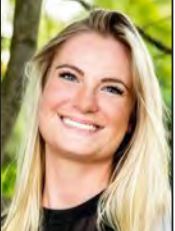 Real-life problem solving Clarisse Marcella Alpaert (Belgium): I am originally from Bruges, Belgium. As an undergraduate at Ghent University, I studied business economics and majored in corporate finance. Tufts University’s MALD program (Master of Arts in Law and Diplomacy) interested me because it offers me a broader perspective on key dynamics in the political economy of development while familiarizing me with new ways to address global challenges. Though this academic year has not been what anyone expected, Fletcher has been a rewarding and challenging experience. Some of my favorite moments from this year include becoming a co-president of the Fletcher Social Investment Group’s leadership board and a member of the Wharton School’s MBA Impact Investment Network & Training competition at the University of Pennsylvania. It allowed me to continue to demonstrate a proactive and multidisciplinary approach to problem solving while working within a cross-functional team of a high caliber. I’m grateful to the Donald R. MacJannet Scholarship for supporting my journey toward a more holistic approach to international business and finance.  Quest for social justice Amaia Elorza Arregi (Spain): I came to Fletcher from the Basque region in the north of Spain. As an undergraduate, I studied political science at the London School of Economics and Law at the Complutense University of Madrid. I have been fascinated by a variety of courses focusing on gender as well as religion and conflict in the Middle East and South Asia. My main goal for my graduate studies was to broaden my knowledge and analytical skills in these areas, in preparation for a career in human rights and social justice, both at home and in the Middle East. Fletcher’s master’s program in Law and Diplomacy is allowing me to do that. I am currently finishing my capstone while working as a teaching assistant and research assistant at Fletcher. I have also applied to political science Ph.D. programs, and if accepted, I will start my doctoral studies in the fall of 2021. Undoubtedly, this career path would not have been possible without Fletcher. This is one of the main reasons why I deeply appreciate the generous contributions of the Donald R. MacJannet Scholarship. I would not have been able to study at Fletcher without financial aid; and right now, I cannot imagine my life without all of these professional and personal experiences. I am really grateful to be a part of this vibrant, challenging, unique community. 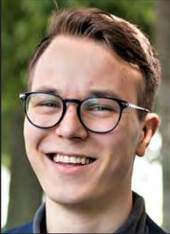 Cross-Atlantic understanding Kyrre Berland (Norway): I am a native of Norway who studied Euro-Asian Affairs as an undergraduate at Sciences Po Paris. Between the wide knowledge I got from my French education and my late mother’s humanitarian work in rural Bhutan before my birth, it seemed logical to me that studying peacebuilding at The Fletcher School would give me an excellent grounding to work for the alleviation of human suffering. This year, I was a research assistant at The Fares Center at Fletcher, exploring inter alia the financing of contemporary conflict on the Horn of Africa. Having worked as a trainee for the Norwegian Ministry of Foreign Affairs on human rights issues at the United Nations in Geneva, I feel confident that fostering cross-Atlantic understanding is of fundamental importance for peace and friendly relations. In addition to my classes, I have participated in The Fletcher Forum of World Affairs, Fletcher’s renowned foreign policy journal. More importantly, I have formed deep friendships with peers, even though our meetings have necessarily been virtual in this time of pandemic. The Fletcher School is indeed a community in which I thrive and grow. And the Donald R. MacJannet Scholarship has been fundamental in enabling me to pursue these studies at Fletcher. 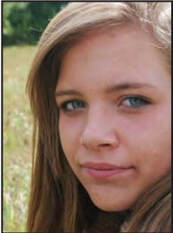 Virtual, but tight-knit Hélène Ries (France/ Switzerland): After earning an undergraduate degree at Pomona College, where I focused on economics, I worked for a public health NGO that taught me the importance of strong relationships between the private and public sector on a global level. I thus decided to attend the Fletcher School, where interdisciplinary work is at the center of all opportunities and courses offered. Actually, coming to the Fletcher School had been a dream since I started my professional career. The Donald R. MacJannet Scholarship has enabled me to pursue a Master of Arts in Law and Diplomacy at Fletcher. Through its International Business Relations concentration, I have learned more about public-private partnerships, my primary area of interest. My first semester at Fletcher confirmed the great first impression I had received from students of the school. In my year and a half at Fletcher (in Medford last year and virtually from Switzerland this year), I have had the opportunity to attend transformative events like the Conference on Gender and International Affairs, which enabled me to view public health issues from a different perspective. I have also interacted with Fletcher alumni now in prominent positions in the health sector, who gave me invaluable insights on their careers and proved the strength of the legendary “Fletcher Mafia.” The difficult past year we have all had to face proved once again how tight-knit and helpful the Fletcher community can be, both in Europe and at large. Thanks to this experience, I am currently launching a career in the pharmaceutical sector, through which I intend to dedicate myself to helping improve and save people’s lives worldwide. As I continue working on public-private partnerships for healthcare companies in my home country, Switzerland, it is clear that I will continue to benefit from the Fletcher network and curriculum for years to come. I hope one day to be able to help students achieve their goals just as you have helped me. |
© 2019 MacJannet Foundation. All rights reserved.
MacJannet Foundation
396 Washington Street, Suite 200
Wellesley Hills, MA 02481
MacJannet Foundation
396 Washington Street, Suite 200
Wellesley Hills, MA 02481

